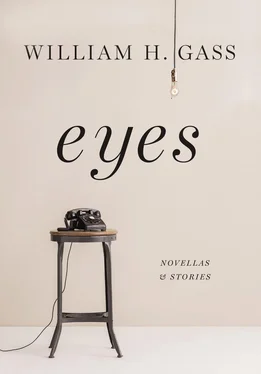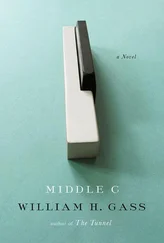Even Mr. Gab’s heroes, even Josef Koudelka, had devoted at least one frame, one moment of his art, to a slice of cheese, bite of chocolate, cut of fruit that had been strewn upon the rumpled front page of the International Herald Tribune to serve as a still life’s prey — a spoiled fish — a party of empty bottles. That’s okay, he heard Mr. Gab say, because such a shot records a lunch, a day, a time in the world. I want that, u-Stew-u, I want the world, I don’t want to see through the picture to the world, the picture is not a porthole. I want the world in —you see— in —the photo. What a world it is after all! Am I a fool? Not to know what the world is; what it comes to? It is misery begetting misery, you bet; it’s meanness making meanness, sure; it’s calamity; it’s cruelty and greed and indifference; I know what it is, you know what it is, we know how it is, if not why — yet I want the world as it is rescued by the camera and redeemed. U-Stu-u. Paris is…was…noisy, full of Frenchmen, full of pain, full of waste, of ordinaire ; but Atget’s Paris, Sudek’s Vienna, Coburn’s London, even Bellocq’s poor whores (I never showed you those ladies, you found out and stared at that filth yourself), Salgado’s exploited, emaciated workers are lifted up and given grace when touched by such lenses; and every injustice that the world has done to the world is forgiven — in the photograph — in…in…where even horse-plopped cobbles come clean.
But what about, the stupid assistant began, what about Haas’s Moreno , a photo full of steps, the dark woman walking toward a set of them, her black back to us, the red and white chickens standing on stairs…they’d all look better gray, he was sure Mr. Gab would say. Or the lane of leaves, that lane of trees beside the Po, or the Norwegian fjord photo, Mr. Gab, the faint central hill like a slow cloud in the water, what of them? what of them? So what, he replied on behalf of Mr. Gab who was somewhat cross, when one can have Steichen’s or Coburn’s streetlamps, spend an evening full of mist and mellow glisten, bite into an avenue that’s slick as freshly buttered toast.
But Mr. Gab, do you dream that Sebastião Salgado wants anyone forgiven: are the starving to be forgiven for starving? are those scenes from Dante’s hell (the hell you told me about) redeemed because the miners of Serra Pelado’s gold — worn, gaunt, covered with mud and rags — are, through his art, delivered from their servitude and given to Dante? am I to be forgiven for my deformities? my rocking, as if I were indeed the baby in the tree, is it okay? If cleverly clicked? o yes, Mr. Gab, you’re right, I did peek at the fancy girls, and I was toasted by one in striped tights and a bonnet of hair who raised to me a shot glass of Raleigh Rye, but so many of them, sad to say, had scratched-out faces, only their bare bodies were allowed to be; while Bellocq too, by the book, was said to be misshapen…not quite like me; but he didn’t dwarf himself, I bet, and behaved himself with the girls because he understood his burden; just as it’s true, I didn’t do me, someone else, perhaps yourself, Mr. Gab, did, but I was not a party to the filthy act that made me, or to the horror of having insufficient room in an unsuitable womb; I didn’t mangle myself, suck the nail from my own thumbs, shorten my stature, wound my mouth; yet daily I inflict them on others; I wobble along on my sidewalk and all those passerby-eyes flee the scene like shoo’d flies.
Should Salgado — u-Stu-u — Mr. Gab rejoins, should he then forget his skills and just picture pain picture human evil picture human greed picture desolation picture people other people have allowed to become battered trees made of nothing but barren twigs, picture many murdered, meadows murdered, hills heaved into the sea, sand on open eyes, the grim and grisly so that it approaches us the way you do on the street, so we will look away, even cross against traffic in order to avoid any encounter, because the overseers of those miners don’t care a wink about them, never let their true condition sneak under a lid, form a thought, suggest an emotion — unless there is a fainter, a sluggard, a runaway — no more than the other workers, who sweat while smelting the ore, give the miners time, since no one thinks of the smelters either, the glare oiling their bare chests, no more than those who stamp some country’s cruel insignia on the country’s coins or dolly a load of now gold bars into a vault think of anyone else but their own beers and bad bread and breeding habits.
But Mr. Gab, sir, when I look at that huge hole in the earth, and at those innumerable heads and shoulders heavy with sacks of dirt like a long line of ants on paths encircling the pit that their own work has bit into the ground, just as you and Dante said hell’s rungs do; against my will, I see something sublime, like the force of a great wind or quake or volcanic eruption.
Yes, u-Stu-u, because u have a book in hand, u aren’t in the picture, u are thousands of miles from Brazil, u wear clean underclothes (I hope and suppose), but can u now reflect on your own sad condition, as molested by fate as they’ve been, those poor workers, because who of us at the end of the day goes home happy? do you go to your room and laugh at its luxury? You saw — it’s less than the whores of New Orleans; don’t you still see trash from your window, and stains on the wall and through a pock or two if you peer into them won’t you encounter again that unearthed creature covered with a silkskin of mud, a man who a moment before the photo was in a long climbing line up the laddered side of one of hell’s excavations, and won’t you continue to find behind him, and free of misery’s place in the picture, another man in shorts and a clean shirt studying a clipboard? and what are we to think of him, then? and what are we to think of ourselves, and the little gold rings we wear when we marry?
Starve the world to amuse a few. That’s man’s motto. That sums it. But now Mr. Gab’s assistant didn’t know — couldn’t tell — who was supposed to have said it.
Alvin Langdon Coburn came up. After a day of silence, his name seemed a train of words. Alvin Langdon Coburn. As if Mr. Gab had really been talking with his assistant as his assistant had imagined. He was holding a paperback copy of Coburn’s autobiography. With a finger to mark his place, Mr. Gab gave it a brief wave. I shall read u-Stu what Alvin Langdon Coburn wrote about those who do dirty tricks with their negatives. Mr. Gab’s voice assumed a surprising falsetto. His assistant had never heard him read aloud out of a book before this moment — a moment that had therefore become important. “Now I must confess I do not approve of gum prints which look like chalk drawings…” Mr. Gab interrupted himself. P.H. was equally fierce and unforgiving, he said. “…nor of drawing on negatives, nor of glycerin-restrained platinotypes in imitation of wash-drawings as produced by…” You won’t have heard of this guy, Mr. Gab added, letting disdain into his voice like a cat into a kitchen. “…Joseph T. Keiley, a well-known…” Well known, well known — not anymore known than a silent-film star. “…American photographer and a friend of Alfred Stieglitz.” They all claimed to be that — a good, a fond friend of Stieglitz. Let’s skip. “…I do not deny that Demachy, Eugene, Keiley and others…” Heard of them, have we? Are they in the history books? are they? take a look. “…and others produced exciting prints by these manipulated techniques…” Bah bah bah-dee-bah. Here—“This I rarely did, for I am myself a devotee of pure photography, which is unapproachable in its own field.” Unapproachable, you hear? Pure. That’s the ticket. That’s the word. Unapproachable. He snapped the book shut and sank back into a silence which said something had been proved, something once for all had been decided.
Читать дальше












